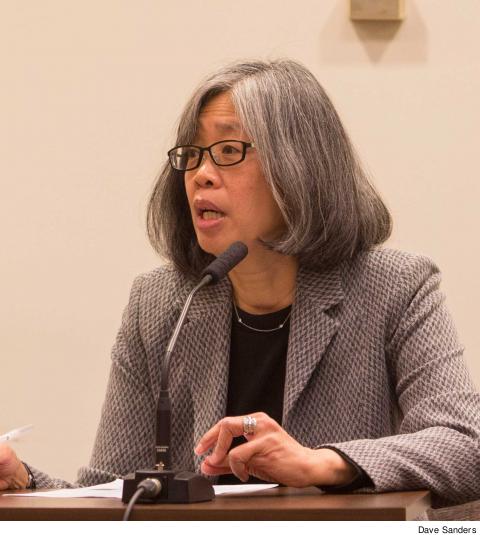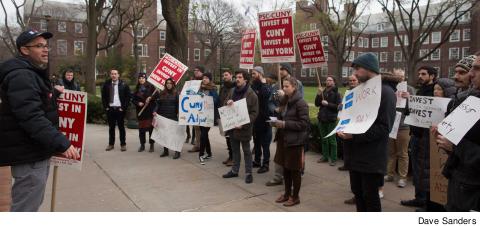Anecdotes of austerity
 |
You don’t need to look hard to find evidence of disrepair and defunding on CUNY campuses. Leaky ceilings, rodent problems and classrooms that are too hot or too cold are just some of the many instances that cause health and safety hazards CUNY-wide. Repairs are often done in haphazard ways, as not enough funding is secured to properly complete many repairs. At the same time, CUNY faculty and staff make do with less. They buy paper, toner and chalk for their classrooms. They are under constant pressure to teach more students, and spend additional working hours in order to provide the individual attention that they believe their CUNY students deserve. “The disrepair of the buildings sends a clear message to the students,” PSC President Barbara Bowen told the City Council’s Higher Education Committee in January. “When a student walks into a room and sees a bucket with a mop holding up the ceiling, it says to the students: ‘You don’t matter.’ It says, ‘You do not deserve a priority environment.’”
In this article, PSC members and chapter chairs share how continued defunding of CUNY has affected the buildings that students learn in and the conditions that faculty and staff work in.
James Davis
PSC Chapter Chair, Brooklyn College
The most common yet most easily overlooked way in which faculty rise to the occasion to support students, thus absorbing the impact of defunding, is by taking more and more students into their classes. The financial imperative to offer fewer sections and the robust increases in student enrollment meet at the doorway to our classrooms.
 |
Requests for “overtallies” (admission of students above the enrollment limit), requests from deans to offer “jumbo” courses or otherwise pack students into a class, trips down a hallway to borrow chairs from a neighboring room – these are regular occurrences at Brooklyn College.
Faculty care deeply about their students’ educational progress and their classroom experience. If they have many more students than usual, the temptation is for instructors to assign less work: fewer or shorter papers and fewer exams or assessments that are standardized for quick turnaround. But that’s not in the students’ interest. Instead, instructors absorb the brunt of the impact of defunding by staying up later at night to read the extra papers or to write the necessary comments. They remain longer on email and in their office hours to make sure their students’ needs are met.
Christine Li
Professor, Department of Biology, The City College of New York
There are vermin problems; one professor mentioned that he couldn’t understand why students were doing “the wave” and jumping up in his classroom, until he realized that they were avoiding mice running across their feet.
Lizette Colón
PSC Chapter Chair, Hostos Community College
A young man, whom I’ll call “X,” is a natural talent, plays the piano like an angel and has a childlike spirit. He would play the piano in our college’s atrium, often staying on campus very late. Once I got to know him better, he confided in me that he preferred to stay at the college until closing time to avoid going home. His family is not supportive of his academic pursuits and he’s under constant pressure to leave home. He would stay at college late, and eat at campus events. He told me that hunger hurts.
He applied to the music program at City College but was not accepted. In their letter to X, City College encouraged him to take private lessons. Once an adjunct who had taught X in his first keyboard class found out that he was not accepted at City College’s music program, she generously provided X with free private lessons. Even though X is no longer a student at Hostos, faculty members arranged with the security director to allow X to have access to the school’s piano. He plays the piano there, and faculty members have also shared many a lunch and dinner with X.
Cindy Bink
Director of Counseling, New York City College of Technology
Some employees place garbage bags over their desks at night because flooding has often damaged student documents. Employees worry about breathing in mold spores because their offices have been flooded so often. A foul stench on a lower-level floor reoccurs every time it rains. In one office, a plastic ceiling tile was designed to collect brown water from a permanent leak that could not be repaired.
Vince DiGirolamo
PSC Chapter Chair, Baruch College
You don’t have to look far to see the everyday effects of underfunding at Baruch College. I know a professor who supplies the department with paper towels from Costco at his own expense. Other faculty members have advanced their graders and teaching assistants rent money. Those with children in other colleges use their children’s resources to gain access to databases available at other university libraries but not at CUNY.
Geoff Kurtz
PSC Chapter Chair, Borough of Manhattan Community College
PSC members in our chapter have taken note of varying levels of disrepair on our campus. It’s common at BMCC to have three to five faculty members in an office, which makes confidential conversations with students impossible. It’s not like classroom conditions are any better. There are a few broken student desks in many classrooms, and even when they’re not broken, the classroom desks are uncomfortable and have too little desk space for a book and notebook. The “professor chair” in many classrooms is broken, and no high stools or lecterns are available. Even though we have a stringent restriction on how much printing we can do, we still run out of copier paper before the end of the Spring semester. Many of us have dealt with wires hanging from open ceiling panels. The physical layout of the library is very disjointed; it’s a patchwork of spaces and badly needs an overall renovation.
Robert Farrell
PSC Chapter Chair, Lehman College
Facilities and buildings and grounds teams at Lehman College do their best to keep the campus in as good as shape as possible. But the absence of a dedicated minor repair fund and understaffing has led to inevitable states of disrepair. A planned fix of a crumbling, high-traffic pedestrian bridge on campus had to be scrapped due to lack of funds. Americans with Disabilities Act compliancy work has remained incomplete for years in our main academic event space. Filthy ceiling tiles in many parts of the campus are slated to be replaced, but there’s no completion date due to inadequate funding. Classrooms and office spaces are locked and unused while the college awaits money to renovate the outmoded spaces. And despite a front-page investigative article in The New York Times in May of last year, serious leaks in the college’s library have yet to be repaired.
But we have fought back. Lehman received more than half of a recent (and wholly inadequate) $20 million capital allocation to CUNY to complete the long-stalled construction of a new nursing building, housed for decades in a more-than-30-year-old “temporary” structure. This was no doubt in large part the result of our chapter’s outspokenness on the topic at Board of Trustees and City Council meetings over the past year and our successful #ReclaimOurSchools campaign.

